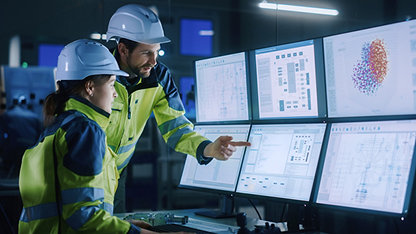The rapid advancements in artificial intelligence (AI) are reshaping most, if not all industries. With the ability to automate human-like tasks, it is expected that will see changes within the workforce across all sectors especially the built environment. In the UK around 1.5 million jobs in England are at high risk of some of their duties being automated in the future1.
What is meant by the term AI and how will it affect jobs?
AI refers to the ability of a computer or machine to imitate intelligent human behaviour, such as learning, reasoning, problem solving and decision making. I’m sure you’ve heard about ChatGPT, the AI chatbot developed by OpenAI. Many are already starting to fear that it has potential to take over some of our most important jobs today. In reality, the impact that AI will have on jobs is a lot more complex though many professionals are uncertain about the future. Whilst AI can provide numerous benefits such as increased efficiency, improved accuracy, and cost-effectiveness, it poses many changes and challenges to the job market. There are three main ways in which AI will shape jobs:
- Job automation: AI has the potential to automate certain tasks that involve repetitive and routine work by replacing workers with technology, this could include computer programmes, algorithms or even robots. Job automation has the potential to lead to unemployment within in industries such as data entry, manual labour, and basic customer service.
- Job transformation: AI can transform jobs by augmenting human capabilities and changing the nature of the work. For example, AI can be integrated into existing jobs so that it can assist professionals in decision-making or provide insights onto strategic planning. This could lead to a re-definition of the job description and require workers to acquire new skills to adapt to the changing market.
- Job creation: Whilst AI may eliminate some jobs, it has the potential to create new ones, The development and widespread use of AI will require skilled workers in developing areas such as data science, machine learning, AI ethics and computer interaction (this refers to the study of how people interact with computers and other digital devices).
How will it affect the built environment?
The built environment refers to the man-made or constructed surroundings in which people live, work, and interact. It includes everything from buildings and infrastructure to rural landscape. The built environment plays a crucial role in shaping our lives, health, and sustainability. With the aid of technology, the built environment has changed a lot over the years. Take design and construction as an example. Computer-aided design (CAD) and building information modelling (BIM) technologies have revolutionised the digitisation process. Technologies like this enable architects, engineers, and construction professionals to create detailed 3D models of buildings which has proven to improve efficiency, accuracy, and cost-effectiveness. Even manual labour has changed vastly over the years. Automation has been integrated into construction processes such as using robots for bricklaying, concrete pouring, and 3D printing building components which results in increased speed and precision during construction. As with any transformative technology the new wave of AI has left many with uncertainty. It has potential to shape the industry but how will it shape our jobs?
What professions are at risk of change?
The integration of AI is likely to impact professions within the built environment, but also is likely to create new job roles. While some roles will become less relevant and most will require more skills, there is little evidence to support the fact that AI will remove jobs overall. However, within the built environment there are certain professions that may be more susceptible to the impact of AI and automation. With input from ChatGPT itself, this includes:
- Construction Workers: With the rise of AI, the construction industry and its workers will likely see a huge shift. It is likely that construction companies will increasingly adopt new technologies such as drones, autonomous equipment, and digital tools in attempt to perform tasks more efficiently and quickly than human workers. It is likely that construction workers will need to adapt to this wave of technology by learning skills around operating machinery, analysing data, and managing AI-enabled systems. This will allow workers to continue labour alongside machines. To remain competitive, some workers will have to shift their skill set into more technical areas such as programming and data analysis.
- Architectural Drafters: Artificial Intelligence (AI) is significantly influencing the role of architectural drafters by automating various aspects of their work, improving accuracy, efficiency, and productivity. With AI-powered software, architectural drafters can generate detailed 3D models and renderings from rough sketches or concepts, reducing the time and effort required for manual drafting. AI algorithms can analyse and optimize building designs for factors such as energy efficiency, structural stability, and cost-effectiveness. AI can also assist in automating repetitive tasks such as generating construction documents, detecting clashes, and performing quality checks, freeing up architectural drafters to focus on higher-level design decisions and creative problem-solving.
- Building Surveyors: AI is likely to impact the role of building surveyors significantly. With the integration of new technologies, such as drones, building surveyors will be able to conduct more efficient and accurate inspections. This can help to identify issues in buildings that may have been overlooked by human surveyors and reduce the likelihood of human error. AI-powered tools can also help to analyse data from sensors and IoT devices to detect potential safety hazards and predict maintenance needs. This can aid building surveyors prioritise their workload and focus on areas of high-risk. It is likely that building inspector will need to collaborate with such machines and learn new skills within managing and interpreting AI data. AI will not replace building surveyors but instead transform the role so that the workers are more reliant on AI to support the decision-making process.
- Quantity Surveyors: With the integration of AI, quantity surveyors will have access to tools that can help them automate tasks such as cost automation, project scheduling and material quantity take-off. AI-powered software can help analyse large amounts of data and identify problems much quicker and accurately than a human which helps surveyors make more accurate predictions and identify potential risks. When used within construction projects, using AI will lead to increased efficiency and cost savings in construction projects. To remain competitive quantity surveyors will need to develop new skills in managing an interpreting data from AI systems and collaborating with machines to perform their work.
- Construction Equipment Operators: As the construction sector starts to adopt new technologies such as drones and sensors which can perform tasks faster and more efficiently than human operators, the roles of construction equipment operators will change. The transformed roles will see a lot more involvement with AI technologies and will require workers to develop skills required for working in tandem with automated equipment.
- Facility Managers: AI can be used to aid facility managers with predictive maintenance, energy management, and space utilization in facilities. AI-powered software can analyse data from sensors and IoT devices to detect potential equipment failures, predict maintenance needs and optimise energy consumption. In this case, AI could be used to help facility managers make decisions and prioritise their work.
- Construction Project Managers: AI is likely to transform the role of construction project managers by automating tasks such as project scheduling, cost estimation and risk management. AI-powered software can analyse large amounts of data from various sources to identify potential issues and suggest solutions, leading to more accurate project planning and forecasting. This can help project managers to make informed decisions which will potentially result in increased efficiency and cost savings within construction projects. AI will not replace the job of project managers, but the role is likely to see a bigger integration with technology as AI develops.
While AI has the potential to automate certain tasks in the built environment, it may also create new opportunities for employment. For example, roles that require expertise in AI, data analysis, and technology management may become more in demand. Additionally, AI can enhance the decision-making and problem-solving capabilities of professionals in the built environment, augmenting their skills and improving overall productivity. As with any technological advancement, it's crucial for professionals in the built environment to adapt to the changing landscape, upskill or reskill as needed, and embrace new ways of working with AI to stay relevant in the evolving job market.
How will the workplace change?
As expected, it’s evident that workplaces are going to undergo significant changes to adapt to this new wave of AI technologies. AI is likely to automate many repetitive and routine tasks, freeing up workers to focus on higher-level tasks that require human skills, such as problem-solving, creativity, and critical thinking. This shift is expected to change the nature of jobs and lead to the emergence of new job roles and skill requirements, such as AI trainers, data scientists, and algorithm developers. Additionally, AI is expected to transform collaboration and communication by enabling remote work, virtual meetings, and shared workspaces. However, the adoption of AI also raises concerns about job displacement, data privacy, and ethical implications, requiring careful consideration and planning to ensure a responsible integration of AI technologies in the workplace. Only time will tell exactly how it will affect us but overall, it seems that the new wave of AI has potential to revelutionalise the industry.
Aaliyah Pollock, Data and Tech Analyst













